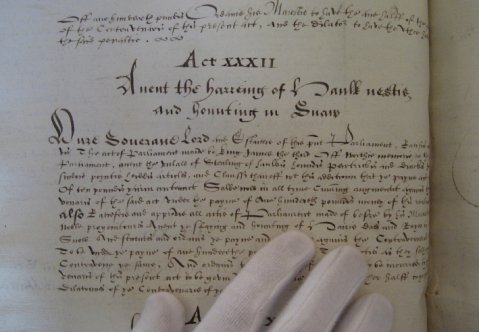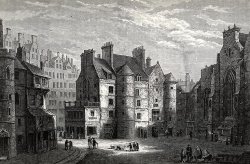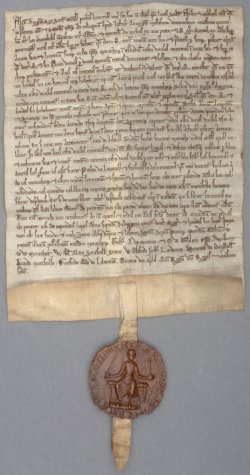The credit crunch… in the 16th Century

Fuel shortages, arguments over tolls on the Forth and Tay, binge drinking, the credit crunch and the ever touchy subject of MPs’ expenses are nothing new – Scottish politicians were fighting about them as far back as the 13th Century, according to a major new parliamentary record to be launched this week.
In a project of unprecedented scale and complexity, researchers from the School of History at the University of St Andrews have created a fully searchable digital database of the proceedings of the Scottish Parliament from its first surviving act of 1235 to its dissolution by the Act of Union of 1707.
The publication online of The Records of the Parliaments of Scotland to 1707 at www.rps.ac.uk makes freely available to all the 16.5 million words which document almost 500 years of Scottish parliamentary history.
The project has taken 11 years to complete and presents the records of the Scottish Parliament in a format that is amongst the most technologically advanced and most user-friendly of any historical record yet published.
For students, scholars and anyone interested in Scotland’s past, the resource offers an immediately accessible and fully searchable point of entry into one of the country’s richest historical sources. As an historical record it is an essential adjunct to understanding not only pre-1707 Scotland but also the Scotland of today.
The project team was led by Professor Keith Brown of the School of History, University of St Andrews.
He said: “From its origins in the 13th Century to its termination in the 18th Century, Scotland’s parliament represented a political legitimacy that could not be ignored. Furthermore, far from being a rudimentary institution, parliament evolved rituals, procedures and a level of self-conscious awareness on a par with any other representative body of that age.
“Scotland has every reason to be proud of its lengthy parliamentary history and the record the institution left behind. It is with great interest that we await to see what new research is created by the users of the resource produced by the project.”
The record reveals that issues such as fuel shortages are far from exclusive to 21st Century Scotland. An act passed by parliament in the reign of Mary Queen of Scots records a “most exorbitant dearth and scantness of fuel” within Scotland – because significant amounts of coal were commonly used in empty ships for ballast. The act outlawed any export of coal beyond that to be used for fire in the ship’s voyage, under the pain of confiscation of the ship.
Similarly, tolls over the rivers Forth and Tay exercised MPs in the 15th Century, although debate concerned ferries rather than bridges. Profiteering by ferrymen on these key routes led to an act setting tolls at a maximum of 12 Scots pennies for each man and accompanying horse (£0.88 in today’s money) and six pennies (£0.44) for each individual traveller.
RPS is the fullest record ever available of the institution that made laws that impinged on each person’s daily life and lay at the heart of the nation for nearly 500 years. It helps explain why Scotland has cherished and distinct legal, religious and educational systems.
It reveals many parallels with present-day issues. Acts from as far back as 1428 legislate on the thorny topic of MPs’ allowances. Parliamentary representatives prior to 1707 were, like their equivalents today, entitled to expenses, including travel allowances and the cost of ceremonial dress. A later act of 1641 modified the allowance to a relatively generous £5 Scots per day, roughly £53 in today’s money.
The record also reveals:
* Members could be fined up to £200 Scots (£6000 in today’s money) for “inappropriate attire” in the chamber.
* Scotland suffered a credit crunch in the 16th Century, forcing Parliament to legislate to control loan sharks as “exorbitant and immoderate interest” had been “the cause and ruin and decay of many ancient livings within this country.”
* Environmental concerns were frequently the centre of debate, although the impetus for action by Parliament was usually the desire to preserve species for hunting or as food supplies. Many Acts were made forbidding the destruction of habitats, including the burning of moorland, sawing down of young trees and cropping of broom.
* Football and golf were famously outlawed by Parliament in the 15th Century in order that men of fighting age practised useful skills such as archery with the threat of an English invasion ever present.
* Gambling laws were tightened in the 17th Century because “honest men ought not expect that any winnings” gained from gambling “can do them good or prosper.” Excessive winnings (above £880 in today’s money) at cards or on the horses were to be donated to the poor of the parish.
* Binge drinking was frowned upon when excessive drinkers and “haunters of taverns” were legislated against by a series of Acts in the 1600s. Anyone found drinking in a pub after 10 p.m. would be subject to corporal punishment or imprisonment.
 A significant collection of parliamentary and committee minutes have been transcribed for the new edition, much of it never before seen in print. Through such records the complexity of parliamentary procedures and sophistication of the institution is much better understood.
A significant collection of parliamentary and committee minutes have been transcribed for the new edition, much of it never before seen in print. Through such records the complexity of parliamentary procedures and sophistication of the institution is much better understood.
Professor Brown explained, “The 19th-Century printed edition, which RPS replaces, took over 60 years to be published in its entirety and its full cost is not known. The printed volumes produced were not intended for individual use, instead being deposited in major public and university libraries. Today copies are rare, are mostly housed within special collection departments and access is often restricted. In contrast, the online edition can be used at home, in school, in the workplace, by individuals or by professional researchers worldwide, at no cost.
“From the outset of the project the philosophy of the editors of RPS was to enable the widest possible access. In addition to correcting mistakes made in the 19th-Century edition, the group have been recovering lost texts, which have been discovered in archives and family records.”
RPS is also the largest single record written in the Scots language, providing an unparalleled history of dialect usage from the late 14th Century until the early 18th Century, and, as such, is a major new language research tool. Linguists are already making use of the search facilities available with the online edition to find significant antedatings for numerous words.
The creation of a new edition has prompted significant research into this once neglected area of Scotland’s history and the resource itself has opened up a huge range of new research topics for future students and historians to engage with. The project team has been at the forefront of recent research into Scotland’s parliamentary past. As a result of this research, and that undertaken by others working within the same field, it overturns the long-held dismissive view that the Scottish Parliament was a weak and ineffective institution.
The Records of the Parliaments of Scotland to 1707 will be formally launched at a Reception in Committee Room One of the Scottish Parliament on Thursday May 15th 2008 at 6 p.m.
ENDS
Notes to Editors
The Scottish Parliament Project dates back to 1996 when Professor Keith Brown approached the then Secretary of State for Scotland, Michael Forsyth, with a proposal for a new version of the obsolete 19th-Century printed edition of the Acts of the Parliaments of Scotland.
Total funding for the project over 11 years amounted to just over £1 million. The large-scale project involved proofing and transcribing text from the original manuscripts, translating them into English and adding an editorial apparatus to the record which is around 16.5 million words in length. Over 30 academics and specialists in their fields provided their expertise, in addition to the core project staff. The website itself has been purpose-built around the resource and represents one of the most advanced historical records yet published online.
NOTE TO PICTURE EDITORS:
IMAGES ARE AVAILABLE FROM THE PRESS OFFICE – CONTACTS BELOW.
Issued by the Press Office, University of St Andrews
Contact Fiona Armstrong, Press Officer on 01334 462530 / 462529, email [email protected]
Ref: credit crunch 120508
View the latest University press releases at www.st-andrews.ac.uk
Category Research